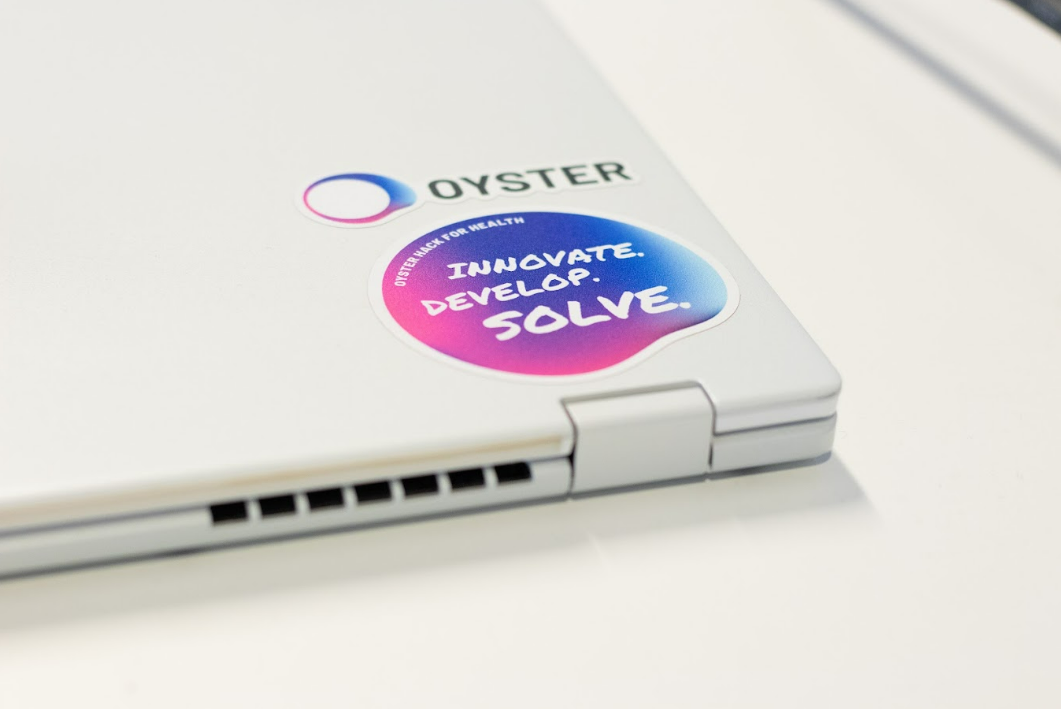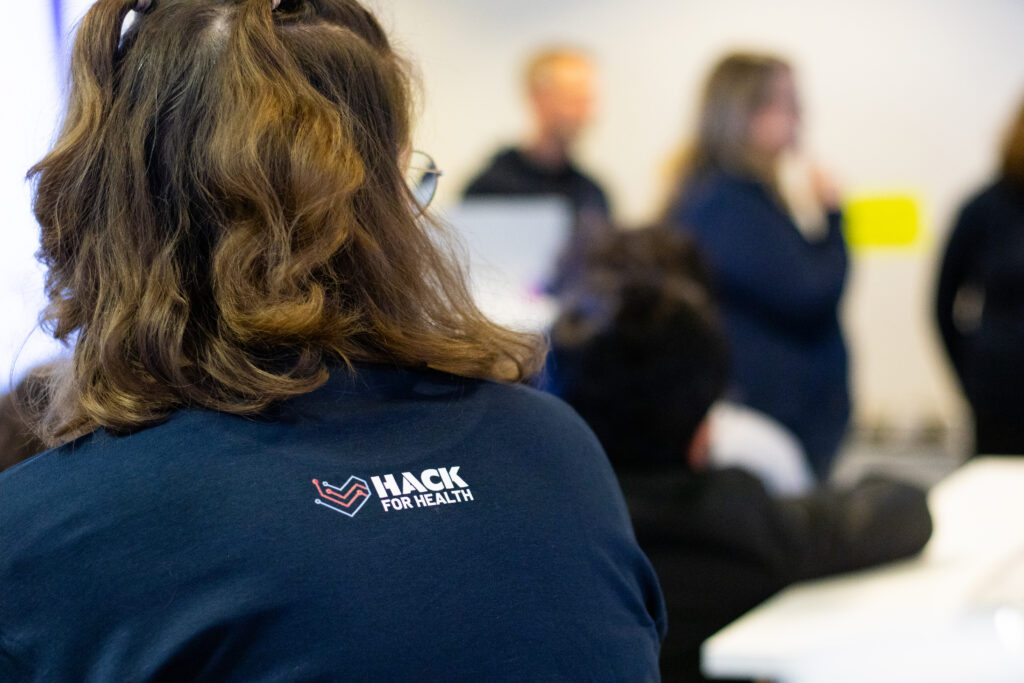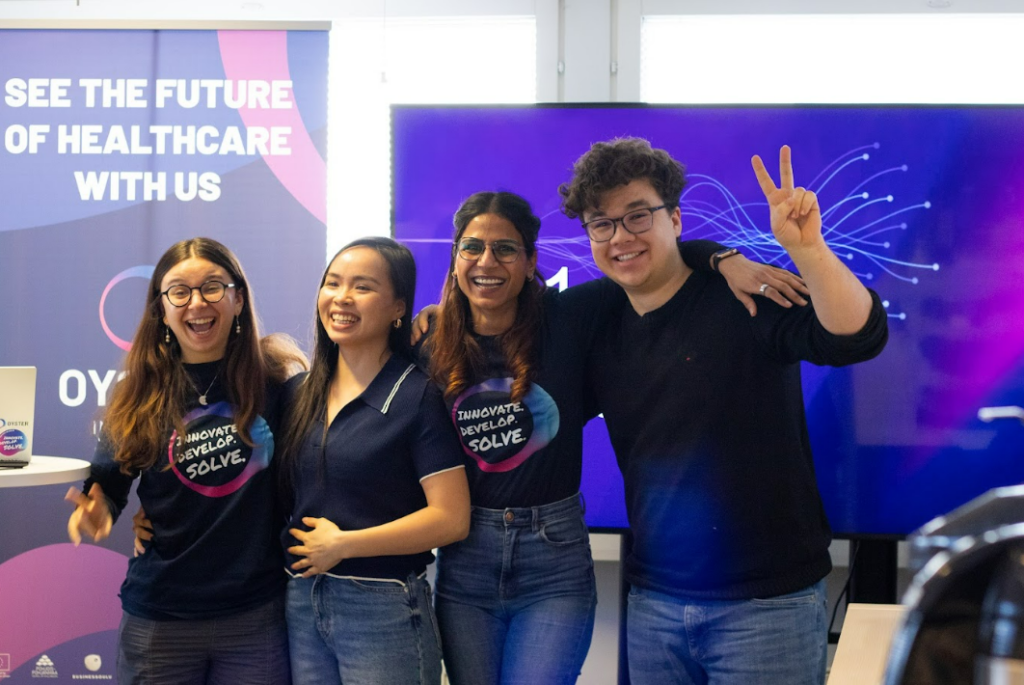Hack4Health: Building the Future of Healthcare in a Weekend

Can a great innovation in healthcare be created in just 54 hours?
While many would hesitate to say ‘yes’ – or perhaps not even consider doing so –, a group of 41 people came together at the OYSTER Incubator premises to challenge this initial perception.
Hack4Health Oulu is a high-energy weekend tech jam where teams collaborate to solve real-world health & well-being challenges brought by OSYTER’s partners. With access to expert mentoring and support from a creative community, teams turn ideas into advanced prototypes, fresh concepts, and innovative solutions.
This year, the hackathon took place between the 4th and the 6th of April, bringing together students, researchers, and professionals in various fields, from medicine to ICT to business development. The format was fast-paced and immersive: 54 hours of ideation, workshops, prototyping, and mentoring, with participants grouped into 11 teams.
Sponsored by POLAR, the event gave teams access to real, functioning wearable devices, enabling them to rapidly test and refine their ideas. The weekend culminated in a high-stakes pitching competition, where each team had just three minutes to present their solution, followed by a two-minute Q&A from the judges. Along with the top 3, one team was crowned with the “best pitch” award.

Among the standout teams was the one that secured first place with their concept: an AI-powered wellness companion that integrates bio-signals from POLAR devices and user-provided health records to deliver personalized, explainable health insights. Designed to help individuals manage stress and monitor overall well-being, the tool allows individuals to receive tailored lifestyle guidance based on their unique physiology and health risks.
“We took on the challenge presented by Polar, Remote Patient Monitoring, with a mission to improve healthcare access,” says team member Gunjan Chandra, whose background in precision medicine and explainable AI at the University of Oulu helped shape the foundation of their solution. “By harnessing electronic health records (EHRs), bio-signals, and even synthetic data, I aim to model the intricate realities of real-world patients and enhance the accuracy and transparency of outcome predictions,” she explains.
The hackathon became an opportunity to take that research out of the lab. “That’s what brought me to Hack4Health with a clear intention: to move this research out of the lab and into real lives”, Chandra adds.
Teamwork and Growth
Working within a tight timeframe, the team had to bridge differences in expertise and professional vocabulary. “From the beginning, we were four individuals with completely different professional backgrounds, which naturally led to some communication challenges,” said Kanella Magdalini Chasapaki. “Each of us spoke our own ‘professional language,’ and that occasionally made it hard to fully understand one another. Time was also a major obstacle: we had just 54 hours to bring our idea to life.”
But being a multidisciplinary team turned out to be one of their greatest strengths. “Our diversity worked in our favour. It made dividing the tasks easier and helped us avoid overlapping responsibilities”, Chasapaki notes. “Because everyone brought their own expertise to the table, our decisions were more informed and balanced.”

Participating in Hack4Health challenged the team to grow beyond their usual boundaries. “It pushed me beyond my comfort zone and exposed me to new ideas and skills”, says Chasapaki. “Collaborating with professionals from different fields improved both my flexibility and my ability to communicate effectively in a team setting.”
Michał Kowalski, the team’s tech specialist, echoes that sentiment. “It was definitely a different experience from what I’m used to. Normally, I work with other engineering students, so our approach to problems tends to be more technical. This time, though, I got to look at things from a more conceptual and business side, which was interesting.”
During the event, Kowalski also worked closely with POLAR devices, and even went beyond his own team to help others. “That experience went really well. I was even asked to assist other teams with their integrations and had the opportunity to write a report for Polar Electro about my work.”
What is next
As for what’s next, the team isn’t slowing down. “While we have an ambitious long-term vision for the project, right now we’re focusing on planning, preparation, and finding the right investors and partners”, says Kowalski. He also expressed a personal interest in continuing to collaborate with Polar. “I’m hopeful that in the future, I’ll be able to contribute to and grow with Polar Electro, either through this project or directly as part of the team.”
Chandra also shared some plans for the future: “I’ve been actively building the core team and meeting with potential candidates to support product development. Additionally, we will soon be meeting with Polar to explore collaboration opportunities”, she explains. “On the funding front, I’ve been in discussions with investors to secure support for the startup, and we are planning to apply for public funding for proof-of-concept.”
In just one weekend, the team turned years of research and expertise into a working prototype with the potential to make healthcare more personalized and proactive. Hack4Health may only last 54 hours, but for some teams, it can be the beginning of something much bigger.
About OYSTER
The OYSTER Incubator, launched in Fall 2024, is a dynamic startup hub operated by OuluHealth stakeholders. By providing tailored mentorship and robust networking opportunities, the OYSTER Incubator accelerates market entry for innovations and bridges the gap between breakthrough research and real-world healthcare impact.
Text: Beatriz Rocha, Health and Life Science, BusinessOulu
Images: © Riikka Savela
